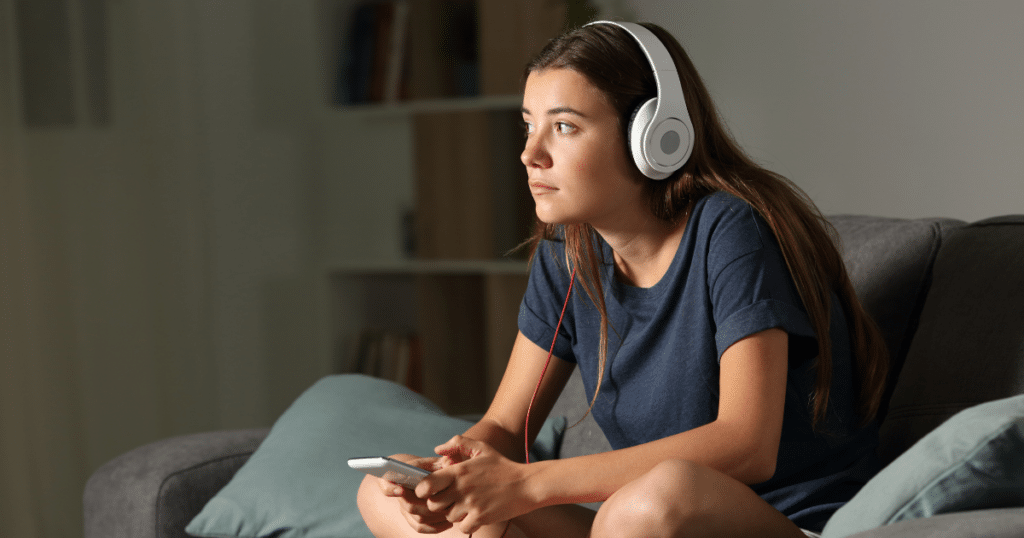What if the key to supporting your teen’s mental health was already playing through their headphones? There’s so much pressure coming from all directions – school, friends, and social media – that teenagers today face mental health challenges like never before.
Through all of this, teens turn up the volume and dive into music as a way to cope, connect, and express themselves. But is music good for mental health? And if it is, how can parents and carers help teens use it to support their well-being?
In this blog, we’ll examine the link between music and teen mental health, which genres are best for improving well-being, as well as potential downsides of certain types of music. We’ll also explore other types of creativity that can help boost your teen’s well-being. With nearly half of teens in the U.S. facing mental health issues, let’s make sure your teen is tuning in to sounds that soothe, inspire, and support them.1
How Music Helps With Teen Mental Health
Music has a special place in many people’s hearts. We feel connected to music, whether we think about a song that holds a particular meaning for us, play instruments in a group with other people, or sing our emotions out at the top of our lungs.
But why is music good for mental health? Well, current research suggests that music plays a role in mood regulation and can be useful for reducing depression and anxiety symptoms.2,3,4 Let’s take a closer look at how music can help with mental health.
Emotional Regulation and Expression
Teens often use music to connect with and express their feelings, thoughts, and ideas, as well as to lighten their mood.5 Fast music can convey happiness or excitement, whereas slow music usually feels sad. By listening to music, teens can better understand their emotions.
Stress and Anxiety Reduction
We’ve probably all listened to a piece of music at some point that seems to just…soothe us. Studies show that when teens listen to or play music, they can reduce their stress and anxiety levels.5 Listening to music can decrease the levels of stress hormones in the body, and playing music can boost a teen’s self-confidence and self-esteem.6,7
Social Connection and Belonging
Listening to and sharing music can help us to create connections with others, bringing a sense of belonging and deepening friendships.5 It can also bring together musicians from different backgrounds, building a sense of togetherness they may not have had before.
Self-Discovery and Identity
Teens often use music to help them define their identity and understand themselves better.5 They find something they can connect to, whether it’s a feeling or lyric in a song, something that reflects who they are and can share it with other people without having to explain in their own words. They may even look to musicians or singers to be a kind of role model for them and how they want to be as adults.8
Music Therapy
Music therapy can help teens heal from trauma, build up their resilience, and reduce their anxiety and depression symptoms. Music therapy uses music to help teens explore their emotions, improve mental well-being, reduce stress, and alleviate pain.2,3,9 Music therapy can include music improvisation, listening to music, writing songs, or performing musical pieces.10
Negative Effects of Music on Mental Health
Music can be great for helping teen mental health, however, there are a few downsides to be considered. Some of these are:5
- They can damage their eardrums and end up with hearing problems if they listen to loud music through headphones.
- If music takes up all of their focus, it could distract them from school and other responsibilities.
- They may hear songs that can make them feel worse.
- They might listen to songs that promote things like violence, discrimination, bad language, drug or alcohol use, or risky sex.
Best Music for Mental Health

Now that you know the benefits music can bring, you may be wondering what is the best music for mental health therapy. As with many things, it comes down to personal preference, but if you’re looking for something to help calm and soothe your teen when they feel distressed, we have some great options below.
Classical Music for Mental Health
Classical music allows the listener to project whatever they are feeling into the music, creating a deeper emotional connection. It can also make you feel more relaxed and reduce your stress levels.11 When you feel more relaxed and calm, your negative emotions can begin to lift.
Relaxing Music for Mental Health
Relaxing music can reduce your stress and anxiety levels, and help to bring about a sense of calmness. You can also use it as a positive distraction from stressful thoughts or situations, shift your focus, and allow it to bring you to a different emotional state.
Nature Sounds for Mental Health
Research suggests that listening to the sounds of nature can help people’s mental health, in particular, the sounds of birdsong can help with stress relief.12 There are apps available with different sounds of nature, from the gentle waves of the ocean to forests brimming with birdsong and the rustling of leaves, and the simple pitter-patter of rainfall. It’s best to try out a few different types and see what works for you.
Additional Helpful Strategies for Teen Mental Health
Music isn’t the only way to help adolescent mental health. There are so many creative hobbies that can help improve well-being and self-care activities that you can make part of your routine. Here are a few ideas to get you started:
- Arts and crafts: Being creative and making something can help you express your thoughts and feelings if you have trouble putting them into words.13
- Writing: Writing can help you to express yourself, organize your thoughts, and deal with your emotions in a healthy way. Whether you are writing in a journal or writing creatively, there is something inherently therapeutic about getting thoughts and ideas out of your head and onto a page.
- Nutrition: Research shows a relationship between a poor-quality diet and worse mental health in children and teens, so help them to make healthy and balanced choices when it comes to food and snacks.14
- Exercise: The DHHS recommends teens get 60 minutes of physical activity every day, and exercise is really important for both your physical and mental health.15 It lowers the amount of stress hormones in the body and boosts endorphins which give you a happy feeling. Whether it’s skateboarding, surfing, dancing, swimming, or yoga, find a physical activity that your teen enjoys and let them reap the benefits.16
Music Therapy and Other Therapy Approaches for Teens
Sometimes, your teen may need some extra support, which is where adolescent mental health treatment such as therapy comes in. There are many types of therapy available that tap into creativity, such as:
- Art therapy: You use art materials such as pens, crayons, paint, or clay, to express your feelings. It can help you to communicate things that you can’t easily express through words and to look at situations in a new way.13
- Music therapy: You don’t need to have any musical experience to do this type of therapy. You listen to music or use instruments to express how you feel. It can help you to communicate difficult thoughts or feelings and express yourself.10
- Surf therapy: This is a type of therapy that combines surfing with therapy. You get the benefits of physical activity in an environment that can bring a sense of calm and connection with nature. But it’s not just about riding the waves. There are activities like group discussions, goal setting, and mindfulness exercises. Research shows it can help teens with mental health problems, showing positive changes in self-esteem, resilience, and depressive symptoms.17
Reach Out for Teen Mental Health Services Today

Music can be a great self-help tool, but sometimes you need to have a bit of extra support. If you’re a parent worried about your teen’s mental health, know that things can get better with the right help and support. At Mission Prep, we take teen mental health treatment seriously and go beyond addressing the symptoms – we want to help them heal and recover so that they can become the best version of themselves and be prepared for whatever challenges they will face in life.
We have treatment programs that are personalized to your teen’s needs, to support them in the best ways possible, including:
- Residential treatment – including group programs and outings such as art therapy, yoga classes, and surf therapy sessions.
- Intensive outpatient programs – including individual therapy and group therapy.
- Outpatient mental health programs – including individual therapy such as CBT and DBT.
To find out more, contact us today to discover how we can give you the support you need and deserve.
References
- National Institute of Mental Health. (n.d.). Mental illness. https://www.nimh.nih.gov/health/statistics/mental-illness
- Gustavson, D. E., Coleman, P. L., Iversen, J. R., Maes, H. H., Gordon, R. L., & Lense, M. D. (2021). Mental health and music engagement: Review, framework, and guidelines for future studies. Translational Psychiatry, 11(1). https://doi.org/10.1038/s41398-021-01483-8
- Aalbers, S., Fusar-Poli, L., Freeman, R. E., Spreen, M., Ket, J. C., Vink, A. C., Maratos, A., Crawford, M., Chen, X., & Gold, C. (2017). Music therapy for depression. Cochrane Database of Systematic Reviews, 2017(11). https://doi.org/10.1002/14651858.CD004517.pub3
- Dingle, G. A., Sharman, L. S., Bauer, Z., Beckman, E., Broughton, M., Bunzli, E., Davidson, R., Draper, G., Fairley, S., Farrell, C., Flynn, L. M., Gomersall, S., Hong, M., Larwood, J., Lee, C., Lee, J., Nitschinsk, L., Peluso, N., Reedman, S. E., … Wright, O. R. L. (2021). How do music activities affect health and well-being? A scoping review of studies examining psychosocial mechanisms. Frontiers in Psychology, 12. https://doi.org/10.3389/fpsyg.2021.713818
- Chen, L. (2023). Influence of music on the hearing and mental health of adolescents and countermeasures. Frontiers in Neuroscience, 17. https://doi.org/10.3389/fnins.2023.1236638
- De Witte, M., Spruit, A., Van Hooren, S., Moonen, X., & Stams, G. (2019). Effects of music interventions on stress-related outcomes: A systematic review and two meta-analyses. Health Psychology Review, 14(2), 294–324. https://doi.org/10.1080/17437199.2019.1627897
- Josyula, R., & Kaci, R. (n.d.). The effect of music on teenagers in combatting stress and improving performance. Journal of Emerging Investigators. https://emerginginvestigators.org/articles/24-099
- Miranda, D. (2013). The role of music in adolescent development: Much more than the same old song. International Journal of Adolescence and Youth, 18(1), 5–22. https://doi.org/10.1080/02673843.2011.650182
- American Psychiatric Association. (n.d.). The transformative power of music in mental well-being. https://www.psychiatry.org/news-room/apa-blogs/power-of-music-in-mental-well-being
- National Center for Complementary and Integrative Health. (n.d.). Music and health: What you need to know. https://www.nccih.nih.gov/health/music-and-health-what-you-need-to-know
- Chanda, M. L., & Levitin, D. J. (2013). The neurochemistry of music. Trends in Cognitive Sciences, 17(4), 179–193. https://doi.org/10.1016/j.tics.2013.02.007
- BBC News. (2022, March 23). Research finds nature sounds “benefit mental health.” https://www.bbc.co.uk/news/uk-england-devon-60840759
- Mind. (n.d.). What are arts and creative therapies? https://www.mind.org.uk/information-support/drugs-and-treatments/talking-therapy-and-counselling/arts-and-creative-therapies/
- O’Neil, A., Quirk, S. E., Housden, S., Brennan, S. L., Williams, L. J., Pasco, J. A., Berk, M., & Jacka, F. N. (2014). Relationship between diet and mental health in children and adolescents: A systematic review. American Journal of Public Health, 104(10), e31–e42. https://doi.org/10.2105/AJPH.2014.302110
- Azar, A. M., Olson, R. D., Piercy, K. L., Troiano, R. P., Ballard, R. M., U.S. Department of Health and Human Services, National Institutes of Health, Centers for Disease Control and Prevention, & President’s Council on Sports, Fitness & Nutrition. (2018). Physical activity guidelines for Americans (2nd ed.). U.S. Department of Health and Human Services. https://odphp.health.gov/sites/default/files/2019-09/Physical_Activity_Guidelines_2nd_edition.pdf
- Beecher, K. (2022, May 2). Teens and exercise: What parents need to know. Mayo Clinic Health System. https://www.mayoclinichealthsystem.org/hometown-health/speaking-of-health/teens-and-exercise
- McKenzie, R. J., Chambers, T. P., Nicholson-Perry, K., Pilgrim, J., & Ward, P. B. (2021). “Feels good to get wet”: The unique affordances of surf therapy among Australian youth. Frontiers in Psychology, 12. https://doi.org/10.3389/fpsyg.2021.721238

















